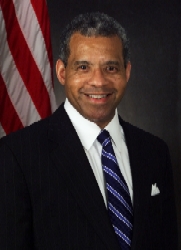Clark Ervin
(lawyer) | ||||||||
|---|---|---|---|---|---|---|---|---|
 | ||||||||
| Born | April 1, 1959 | |||||||
| Alma mater | The Kinkaid School, Oxford University, Harvard Law School | |||||||
| Member of | Council on Foreign Relations/Members, Rhodes Scholar/1980, Squire Patton Boggs | |||||||
Inspector General of the United States Department of Homeland Security, then lobbyist
| ||||||||
Clark Kent Ervin was the head of the Homeland Security Program[1] at the Aspen Institute until 2018. From 2003 to 2004, he served as the very first Inspector General of the Department of Homeland Security (DHS), and from 2001 to 2002, as the Inspector General of the Department of State and, simultaneously, the Broadcasting Board of Governors (BBG), the global propaganda arm of the US government.[2]
He is presently (2021) a lawyer with the lobbyist and law firm Squire Patton Boggs.
Education
Ervin graduated from The Kinkaid School in 1977, Harvard College in 1980, and Harvard Law School in 1985, all with honors. Between college and law school, Ervin studied Philosophy, Politics and Economics at Oxford as a Rhodes Scholar, earning a master's degree in 1982.
Political career
He was appointed on December 26, 2003, in a recess appointment by President George W. Bush. Prior to appointment, he had been the acting inspector general since January 10, 2003.[3] During his tenure, Ervin issued a number of reports critical of mismanagement and security flaws at the newly formed Department. In December 2004, his recess appointment expired, and the White House declined to nominate him for confirmation by the United States Senate.
The end of his term was controversial. Critics viewed the lack of White House support as retribution for Ervin's aggressive efforts to root out waste, fraud, and incompetence. For example, "I think this was a voice that was a little too critical and made the administration a little too uncomfortable," said the executive director of the Project on Government Oversight. The White House disagreed with that perspective, saying "His term expired and that's that."[4] In May 2006, Ervin published a book — Open Target: Where America is Vulnerable to Attack—that gives details of his tenure at the DHS as well as his views on the current lack of preparedness for new terrorist attacks.
Prior to his service at DHS, Ervin served as the Inspector General of the United States Department of State and the Broadcasting Board of Governors. Before his work for the Bush administration, Ervin served in Texas state government:
- From 1995 until 1999, he served as the Assistant Secretary of State of Texas;
- From 1999 until April 2001, he served as Deputy Attorney General, General Counsel, and Director of Administration in the office of then Texas Attorney General John Cornyn.
Ervin served in the first Bush White House from 1989 to 1991 as the Associate Director of Policy in the Office of National Service. He returned to his native Houston in 1991 to run for the 29th Congressional district seat, winning the Republican nomination but losing the general election.
He was the co-chairman for Barack Obama's transition team for DHS in 2008. He was also one of the eight members of the bi-partisan Commission on Wartime Contracting in Iraq and Afghanistan.[3][5]
Law career
Ervin has practiced law in the private sector in Houston twice, first with Vinson & Elkins from 1985 to 1989, and later with Locke, Liddell & Sapp from 1993-1995. Ervin is currently a partner in the Washington, DC law firm Squire Patton Boggs.[3]
References
- ↑ https://web.archive.org/web/20051214145145/http://www.aspeninstitute.org/site/c.huLWJeMRKpH/b.612917/k.9F70/Homeland_Security_Initiative.htm
- ↑ https://1npdf11.onenorth.com/pdfrenderer.svc/v1/ABCpdf11/GetRenderedPdfByUrl//clarkervin.pdf/?url=https%3a%2f%2fwww.squirepattonboggs.com%2fen%2fprofessionals%2fe%2fervin-clark-kent%3fpdf%3dtrue&attachment=false
- ↑ a b c https://web.archive.org/web/20130821192013/http://www.pattonboggs.com/professional/clark-ervin
- ↑ https://abcnews.go.com/WNT/Investigation/story?id=316582&page=1
- ↑ http://cybercemetery.unt.edu/archive/cwc/20110929213815/http://www.wartimecontracting.gov/